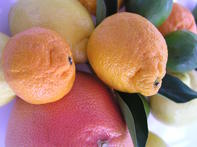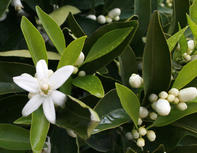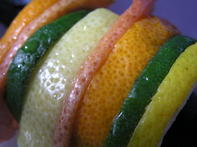Citrus is a collective term for a genus of flowering trees and shrubs in the rue family, Rutaceae. Citrus plants produce important fruit crops such as oranges, mandarins, lemons and limes and grapefruit. Citrus fruit originates from South East Asia, across the region stretching from Southern China to Northeast India.
Citrus crops have been cultivated in these regions for centuries and over time the cultivation of these fruits has spread to Mediterranean and subtropical production regions throughout the world. Citrus fruit is produced on evergreen trees. Citrus trees produce blossoms in spring and the fruit develops through spring and summer ripening for harvest in late autumn and early winter. Citrus fruit is segmented and has a thick skin.
The fruit is usually peeled before consumption and the skin, also called rind and the outer edge is called zest, is generally discarded. All citrus fruits contain citric acid and ascorbic acid, better known as Vitamin C. Citrus fruits are characterised by their sharp flavour and some citrus types, such as lemons and limes, are sour or tart to the taste, while others are sweet. The fruits generally have a strong fragrance, largely due to the limonoid oils contained mostly in the skin of the fruit.



 The South African citrus industry is the largest citrus exporter in the Southern Hemisphere and accounts for more than 60% of Southern Hemis...
The South African citrus industry is the largest citrus exporter in the Southern Hemisphere and accounts for more than 60% of Southern Hemis... The most popular citrus types farmed in South Africa include oranges, lemons, limes, grapefruits and soft citrus. Oranges are by far South A...
The most popular citrus types farmed in South Africa include oranges, lemons, limes, grapefruits and soft citrus. Oranges are by far South A...